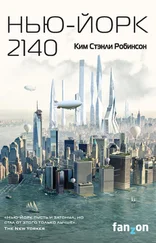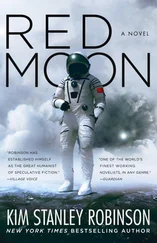“The parrots and the mynah birds and the quetzals are real. The New Guinea lories are real, though they aren’t native to the area. The rest are not real, not in the way you mean. Haven’t you ever seen gene-engineered hummingbirds?”
Flashes of saffron, violet, pink, silk blue, scarlet, tangerine. “No, I don’t believe I have.”
“You need to travel more.” She laughed at the look on his face, kissed him, took his arm and pulled him along. “Come on, they make some fine bikes here, that’s something you know about.”
A day in a tropical market. Sharp smells of cinnamon and clove, the bleating of a pig, the clashing of amplified guitar riffs, the heat, dust, light, noise. Tom followed Nadezhda’s lead, dazed.
In the end they spent all the money they had brought ashore. The ship unloaded some microchips, titanium, manganese and wine, and took on coffee, stereo speakers, clothing and gene-engineered seeds.
The following evening, the last before they embarked, they went back ashore and danced the night away, sweating in the warm tropical air. Very late that night they stood on the dance floor swaying slightly, arms around each other, foreheads pressed together, bodies all around them.
* * *
They set sail, headed west across the wide Pacific. Endless days in the blue of water and sky. Tom became a connoisseur of clouds. He took more of the geriatric drugs. He spent time in the foretop, he spotted whales and dreamed great dreams. They passed a coral atoll and he dreamed a whole life there, Polynesian sensuousness in the peace of the lagoon.
* * *
One balmy evening Nadezhda’s class met on the foredeck, and Tom described his part in the struggle to make the international agreements curtailing corporations. “It was like trust busting in Teddy Roosevelt’s time. In those days people agreed monopolies were bad because they were bad for business, basically—they cut at the possibility of free trade, of competition. But multinational corporations were a similar thing in a new format—they were big enough to make tacit agreements among themselves, and so it was a cartel world. Governments hated multinationals because they were out of government control. People hated them because they made everyone cogs in machines, making money for someone else you never saw. That was the combination needed to take them on. And even then we nearly lost.”
“You talk like it was war,” Pravi said scornfully. She was one of the sharpest of Nadezhda’s students, well-read, quick-minded, skeptical of her teachers’ memories and biases.
“It was war,” Tom said, looking at her with interest. In the twilight the whites of her eyes looked phosphorescent, she seemed a dangerous young Hindu woman, a Kali. “They bought people, courts, newspapers—they killed people. And we really had to put the arm on the countries who decided that becoming a corporation haven would be a good source of revenue.”
“Put the arm on them,” Pravi said angrily. “You superpowers in your arrogance, ordering the world around again—what was it but another form of imperialism. Make the world do what you decide is right! A new kind of colonialism.”
Tom shrugged, trying to see her better in the dusk. “People said that when the colonial powers lost sovereignty over their colonies, but kept the power by way of economic arrangements. That was called neo-colonialism, and I see the point of it. But look, the mechanisms of control and exploitation in the neocolonialist set-up were precisely the corporations themselves. As home markets were saturated it became necessary to invest abroad to keep profits up, and so the underdeveloped world was subsumed.”
“Exactly.”
“All right, all right. But then to cut the corporations up, distribute their assets down through their systems to constituent businesses—this amounted to a massive downloading of capital, a redistribution of wealth. It was new, sure, but to call it neocolonialism is just to confuse things. It was actually the dismantling of neo-colonialism.”
“By fiat! By the command of the superpowers, telling the rest of the world what to do, in imperial style! Putting the arm on them, as you put it!”
“Well look, we haven’t always had the kind of international accords that now exist to take global action. The power of the United Nations is a fairly recent development in history. So some coercion by powerful countries working together was a political necessity. And at the time I’m speaking of capital was very mobile, it could move from country to country without restraint. If one country decided to become a haven, then the whole system would persist.”
“At that point third world countries would have been in power, and the superpowers would have become colonies. You couldn’t have had that.”
“But the haven countries wouldn’t have had the power. They might have skimmed away something in taxes, but in essence they would become functionaries of the corporations they hosted. That’s how powerful corporate capitalism was. You just have no idea nowadays.”
“We only know that once again you decided our fate for us.”
“It took everyone to do it,” Tom said. “A consensus of world opinion, governments, the press. A revolution of all the people, using the power of government—laws, police, armies—against the very small executive class that owned and ran the multinationals.”
“What do you mean, a revolution?” another student asked.
“We changed the law so much, you see. We cut the corporate world apart. The ones that resisted and skipped to haven countries had their assets seized, and distributed to local parts. We left loose networks of association, but the actual profits of any unit company were kept within it in a collective fashion, nothing sucked away.”
“A quiet revolution,” Nadezhda said, trying to help out.
“Yes, certainly. All this took years, you understand. It was done in steps so that it didn’t look so radical—it took two working generations. But it was radical, because now there’s nothing but small businesses scattered everywhere. At least in the legal world. And that’s a radical change.”
Accusing, triumphant, Pravi pointed a finger at him. “So the United States went socialist!”
“No, not exactly. All we did was set limits on the more extreme forms of greed.”
“By nationalizing energy, water and land! What is that but socialism?”
“Yeah, sure. I mean, you’re right. But we used it as a way to give everyone the opportunity to get ahead! Basic resources were made common property, but in the service of a more long-distance self-interest—”
“Altruism for the sake of self-interest!” Pravi said, disgusted. Her aggression, her hatred of America—it irritated Tom, made him sad. Enemies everywhere, still, after all these years, even among the young. What you sow you will reap, he thought. Unto the seventh generation.
“Sociobiologists say it’s always that way,” he said. “Some doubt the existence of altruism, except as a convoluted form of self-interest.”
“Imperialism makes one cynical about human nature,” Pravi said. “And you know as well as I that the human sciences are based on philosophical beliefs.”
“No doubt.” He shrugged. “What do you want me to say? The economic system was a pyramid, and money ran up to the top. We chopped the pyramid off and left only the constituent parts down at the base, and gave the functions that higher parts of the pyramid served over to government, without siphoning off money, except for public works. This was either altruism on the largest scale ever seen in modern times, or else very enlightened self-interest, in that with wealth redistributed in this way, the wars and catastrophes that would have destroyed the pyramid were averted. I suppose it is a statement of one’s philosophy to say whether it was one or the other.”
Читать дальше
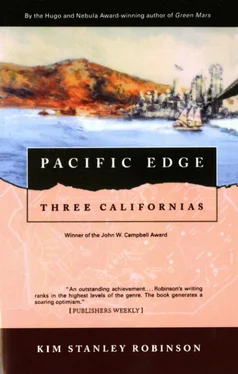
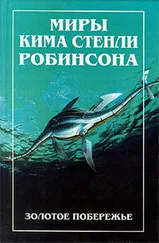
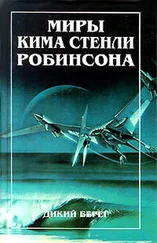


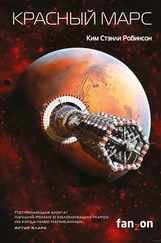

![Ким Робинсон - Годы риса и соли [litres]](/books/394367/kim-robinson-gody-risa-i-soli-litres-thumb.webp)
